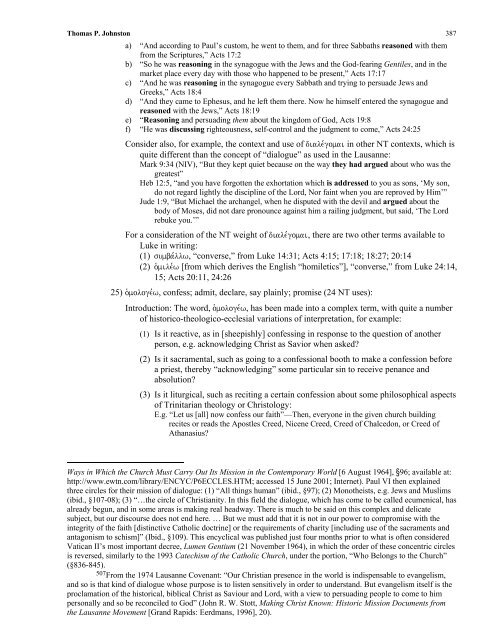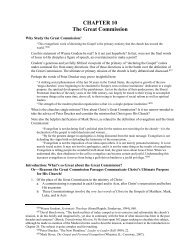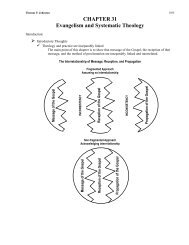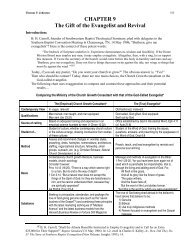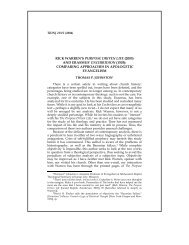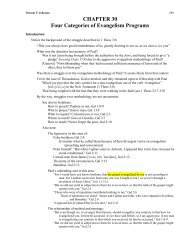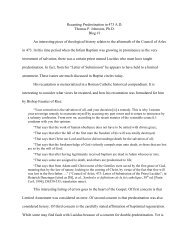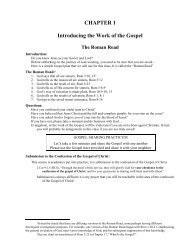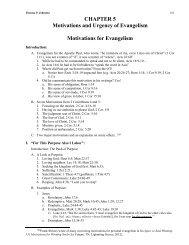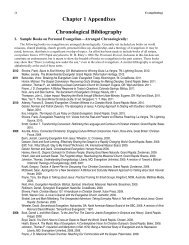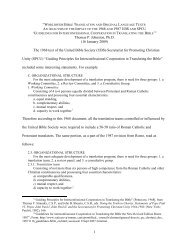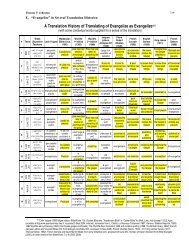CHAPTER 7 Defining Evangelizing - Evangelism Unlimited
CHAPTER 7 Defining Evangelizing - Evangelism Unlimited
CHAPTER 7 Defining Evangelizing - Evangelism Unlimited
You also want an ePaper? Increase the reach of your titles
YUMPU automatically turns print PDFs into web optimized ePapers that Google loves.
Thomas P. Johnston 387<br />
a) “And according to Paul’s custom, he went to them, and for three Sabbaths reasoned with them<br />
from the Scriptures,” Acts 17:2<br />
b) “So he was reasoning in the synagogue with the Jews and the God-fearing Gentiles, and in the<br />
market place every day with those who happened to be present,” Acts 17:17<br />
c) “And he was reasoning in the synagogue every Sabbath and trying to persuade Jews and<br />
Greeks,” Acts 18:4<br />
d) “And they came to Ephesus, and he left them there. Now he himself entered the synagogue and<br />
reasoned with the Jews,” Acts 18:19<br />
e) “Reasoning and persuading them about the kingdom of God, Acts 19:8<br />
f) “He was discussing righteousness, self-control and the judgment to come,” Acts 24:25<br />
Consider also, for example, the context and use of diale,gomai in other NT contexts, which is<br />
quite different than the concept of “dialogue” as used in the Lausanne:<br />
Mark 9:34 (NIV), “But they kept quiet because on the way they had argued about who was the<br />
greatest”<br />
Heb 12:5, “and you have forgotten the exhortation which is addressed to you as sons, ‘My son,<br />
do not regard lightly the discipline of the Lord, Nor faint when you are reproved by Him’”<br />
Jude 1:9, “But Michael the archangel, when he disputed with the devil and argued about the<br />
body of Moses, did not dare pronounce against him a railing judgment, but said, ‘The Lord<br />
rebuke you.’”<br />
For a consideration of the NT weight of diale,gomai, there are two other terms available to<br />
Luke in writing:<br />
(1) sumba,llw, “converse,” from Luke 14:31; Acts 4:15; 17:18; 18:27; 20:14<br />
(2) o`mile,w [from which derives the English “homiletics”], “converse,” from Luke 24:14,<br />
15; Acts 20:11, 24:26<br />
25) o`mologe,w, confess; admit, declare, say plainly; promise (24 NT uses):<br />
Introduction: The word, o`mologe,w, has been made into a complex term, with quite a number<br />
of historico-theologico-ecclesial variations of interpretation, for example:<br />
(1) Is it reactive, as in [sheepishly] confessing in response to the question of another<br />
person, e.g. acknowledging Christ as Savior when asked?<br />
(2) Is it sacramental, such as going to a confessional booth to make a confession before<br />
a priest, thereby “acknowledging” some particular sin to receive penance and<br />
absolution?<br />
(3) Is it liturgical, such as reciting a certain confession about some philosophical aspects<br />
of Trinitarian theology or Christology:<br />
E.g. “Let us [all] now confess our faith”—Then, everyone in the given church building<br />
recites or reads the Apostles Creed, Nicene Creed, Creed of Chalcedon, or Creed of<br />
Athanasius?<br />
Ways in Which the Church Must Carry Out Its Mission in the Contemporary World [6 August 1964], §96; available at:<br />
http://www.ewtn.com/library/ENCYC/P6ECCLES.HTM; accessed 15 June 2001; Internet). Paul VI then explained<br />
three circles for their mission of dialogue: (1) “All things human” (ibid., §97); (2) Monotheists, e.g. Jews and Muslims<br />
(ibid., §107-08); (3) “…the circle of Christianity. In this field the dialogue, which has come to be called ecumenical, has<br />
already begun, and in some areas is making real headway. There is much to be said on this complex and delicate<br />
subject, but our discourse does not end here. … But we must add that it is not in our power to compromise with the<br />
integrity of the faith [distinctive Catholic doctrine] or the requirements of charity [including use of the sacraments and<br />
antagonism to schism]” (Ibid., §109). This encyclical was published just four months prior to what is often considered<br />
Vatican II’s most important decree, Lumen Gentium (21 November 1964), in which the order of these concentric circles<br />
is reversed, similarly to the 1993 Catechism of the Catholic Church, under the portion, “Who Belongs to the Church”<br />
(§836-845).<br />
507 From the 1974 Lausanne Covenant: “Our Christian presence in the world is indispensable to evangelism,<br />
and so is that kind of dialogue whose purpose is to listen sensitively in order to understand. But evangelism itself is the<br />
proclamation of the historical, biblical Christ as Saviour and Lord, with a view to persuading people to come to him<br />
personally and so be reconciled to God” (John R. W. Stott, Making Christ Known: Historic Mission Documents from<br />
the Lausanne Movement [Grand Rapids: Eerdmans, 1996], 20).


